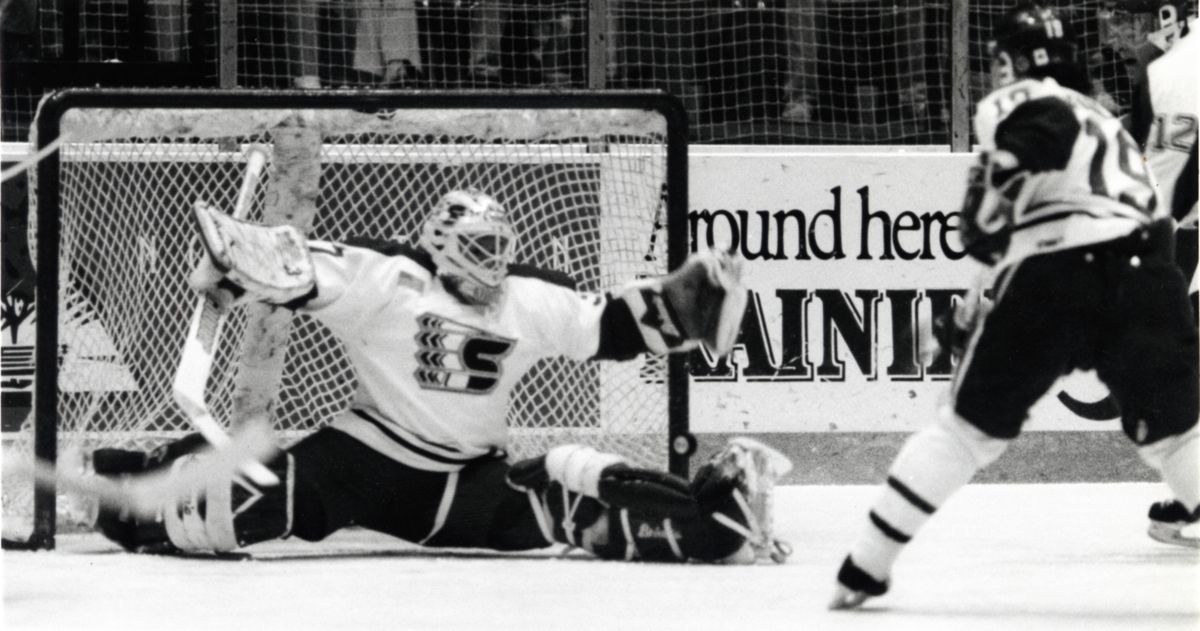Ex-Chiefs star happy with a cup of coffee

Maybe it was the short time Trevor Kidd spent in Spokane, you know, the proverbial cup of coffee.
Anyway, after 14 years of playing professional hockey, Kidd retired to Winnipeg, Manitoba, in 2006 and started Mountain Bean Coffee.
“It’s like Starbucks with a Canadian look,” he said. “It’s a full-branded concept I started from the ground up. It keeps the competitive juices flowing. I enjoy the creative part of it more than anything.”
Kidd was back in Spokane recently when the Spokane Chiefs recognized their Top 25 players for 25 years.
Not bad for a player whose career here covered 32 games.
The goalie was humbled to be acknowledged considering his short tenure with the Chiefs but it’s impossible to overlook his impact.
Kidd arrived in a blockbuster trade with Brandon on Jan. 21, 1991, expected to be the final piece of the puzzle to back-stop the high-flying Chiefs of Ray Whitney and Pat Falloon to a long playoff run.
Ultimately, that’s exactly what he did.
Kidd played in 14 regular season games, posting a 3.52 goals-against average, more than respectable in those days of wide-open offenses. Tri-City featured Kyle Reeves with 89 goals in 63 games and Brian Sakic with 122 assists. Whitney led the league with 185 points, 67 goals and 118 assists.
Obviously, they needed Kidd, an all-star with Brandon in 1990, when he was named the CHL Goaltender of the Year and a three-time veteran for Team Canada in the World Junior Championships, winning two gold medals.
The cost for the 1990 first-round NHL draft pick, 11th overall, of the Calgary Flames, was steep in steady forward Bobby House and prospect Marty Murray, who had two 100-point seasons for the Wheat Kings and was a fourth-round pick of the Flames, and goalie Don Blishen.
“It was a total whirlwind,” Kidd recalled. “I got the news in some little conference room we used surrounded by a bunch of pizza boxes, and the next day I was under the seats on a bus coming here.
“It was my first time away from home. It was a different experience. I haven’t had contact with my billets but I was fortunate to have them give me the family component.”
Once the playoffs started there was no stopping the Chiefs. They won 14 of 15 games in the WHL playoffs as Kidd posted two shutouts and a 2.07 GAA. He won three Memorial Cup games with a 1.67 GAA.
Next he was the backup to Sean Burke on the 1992 silver medal Olympic team. He also had some stellar seasons as he played 12 seasons in the NHL with Calgary, the Carolina Hurricanes, Florida Panthers and Toronto Maple Leafs, before playing a final season in Germany.
But don’t think his few months in Spokane weren’t special.
“You don’t appreciate the times when they’re happening,” Kidd said. “I had a nice, long NHL career, but I didn’t win a Stanley Cup so you look at winning here, winning a championship, is a big memory for me.”
Kidd and his wife, Tiffany, have three athletic daughters, Taylor, 16, Kennedy, 12, and Emerson, 8. The oldest travel throughout Canada playing soccer.
“I’ve really enjoyed retirement that way, spending time with my kids,” he said. “When you’re playing, you’re part of the family component, but to some degree you’re not. You eat, sleep and get ready for the next game so you miss out on a lot.”
It also makes him appreciate what other WHL players went through. Kidd’s hometown of Dugald, Manitoba, is basically a Winnipeg suburb and Brandon is just a couple hours west.
“So many kids playing away from home,” he marveled. “You’re not only learning hockey, you’re developing as a person. I still have some parenting to do.”
Kidd was impressed with what he saw on his first trip back to Spokane, including the Arena and the team playing in it.
“It’s changed from when I played,” he said. “You look at guys coming in at 16, they’re bigger, they’re faster, they’re stronger. There are more guys cracking the NHL now at 18 than there ever were. You have more guys making an impact at 17 and 16. Hockey players are more mature than they ever were.”
The rewards are worth it.
“I was so fortunate, the lifestyle it provided me, financial stability, a great family,” he said. “That and great friendships with a lot of people. I saw so much of the world. I was 19 playing in the Olympics … then traveling in the NHL, playing in front of 20,000 people in different cites. It’s a life-long experience.”
And returning to his roots was almost overwhelming.
“You come back here and it’s like we were out hitting the golf ball together yesterday or last week or the week before,” he said. “You’d never know it has been 15 or 20 years. It’s bizarre. It’s like it was yesterday, it’s just the coolest thing.
“It’s what (Kevin) Sawyer said, ‘You don’t realize it now but what you’re experiencing now will carry with you for a lifetime.’ ”
And it might even give you a cup of coffee.